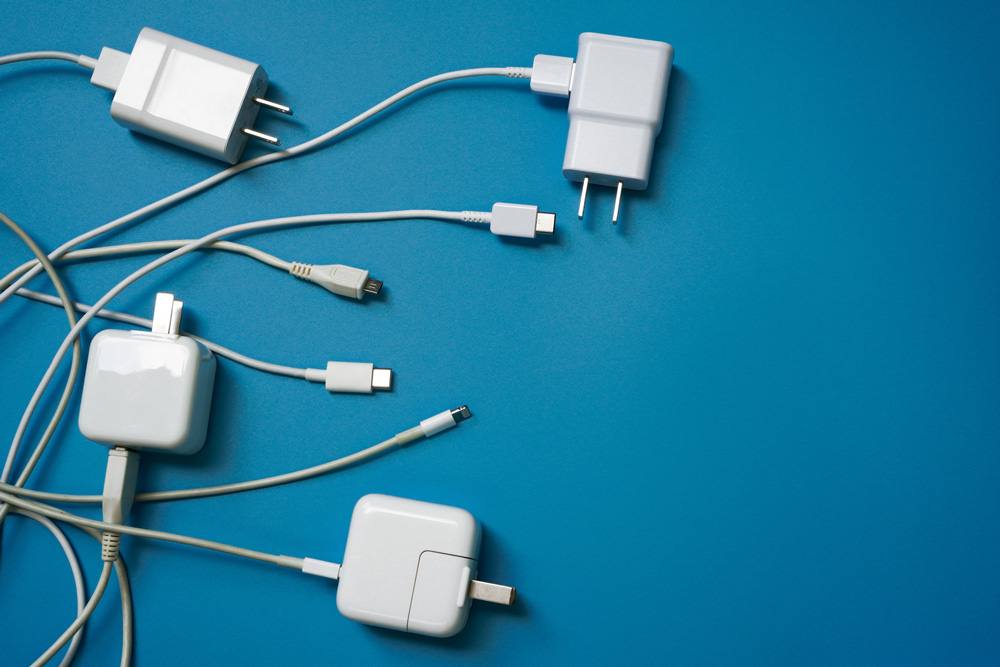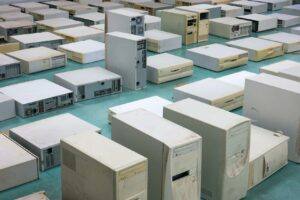Every electronic device in your business has batteries, chargers or other cables and cords, from laptops to desktop computers, networking equipment to docking stations and power tools to task-specific handheld devices.
What’s more, they tend to wear out faster than the devices they support. Replacing them can become more of a regular chore for your IT team than you might like, and then there’s the question of what to do with the old ones.
If you’re asking Cobalt, the answer is obvious – recycle them, of course!
Let’s talk about what the problem is, why recycling batteries, chargers and cables/cords is important and how it can be part of the solution.
The E-Waste Problem
E-waste disposal is a fast-growing problem in the United States and around the world.
DoSomething.org reports that e-waste is the fastest growing municipal waste stream in the United States. It makes up only 2 percent of the trash in our landfills, it accounts for 70 percent of the nation’s toxic waste.
According to The Balance Small Business, “The amount of worldwide e-waste generation is expected to exceed 50 million tons by 2020.” That figure is projected to grow 4-5 percent every year, and “Only 20 percent of e-waste is documented to have been collected and recycled, despite high-value recoverable materials such as copper and gold.”
Chargers, cables and cords for electronic devices make up more of the volume than one might think, until you really think it through. It seems like every time we buy a new laptop, smartphone or tablet, it comes with a new cable or charger and a port that makes it impossible to use the old cable or charger. The result is a kitchen drawer or box in the basement full of old charging cords and stations.
United Nations University, in its “The Global E-waste Monitor 2017” reported, “One million tons of external power supplies are manufactured each year. This highlights the importance of efforts to reduce the number of such power supplies, and to make them more sustainable.”
It’s become so much of an issue that the European Parliament recently approved a resolution calling for requirements that manufacturers design mobile devices so that “common chargers” can be used with all of them, regardless of brand.
Meanwhile, the problem is literally piling up, with more chargers and cables wind up in landfills every day.
Why Recycle Batteries, Chargers and Cables/Cords?
There are four great reasons to recycle batteries, chargers and cables/cords from smartphones, tablets, laptops, desktop computers and other electronic office equipment, both from your business and your personal devices.
They could be harmful.
E-waste can be dangerous on its own or create dangers for people and the environment. This is especially true of batteries, which contain heavy metals and other toxic materials that can leech into soil and groundwater around landfills, causing damage to ecosystems and sometimes finding their way into the human food chain. Batteries can also be a fire hazard. In fact, they are a leading source of fires in sanitation vehicles and waste processing centers.
They could be valuable.
Cables and cords typically contain copper and aluminum, and the copper, in particular, is valuable. In addition, by recycling, you reduce the amount of raw copper that needs to be mined for new devices. This helps keep prices low, by ensuring a steady stream of usable metal for manufacturing.
They take up essential landfill space.
According to the Solid Waste Environmental Excellence Protocol, “…over the next five years, total landfill capacity in the U.S. is forecast to decrease by more than 15 percent. This means that by 2021 only 15 years of landfill capacity will remain. However, in some regions it could be only half that.” The 80-85 percent of electronics that are not recycled are taking up a lot of that space.
They could put you or your business on the wrong side of the law.
In many places it’s illegal dispose of electronics like you would get rid of typical trash in a handling stream that will ultimately dump it in a landfill. In the words of BigGreenPurse.com, “Throwing e-waste away, even if it’s ‘only’ electrical wires and cables, is illegal in the United Kingdom, much of Europe and numerous jurisdictions in the United States.”
When should it be done?
Essentially, any time you or someone in your company is holding something with a battery, charger or cable/cord attached, trying to decide how to dispose of it, that’s when you should recycle. Do it any time you refresh or update your IT assets and equipment, along with accessories like keyboards and mice with cables attached. Similarly, when it’s time to replace anything that’s not part of your IT setup, like power tools or closed-circuit radio equipment, make sure you recycle the chargers and cables/cords at the same time.
If Cobalt is your designated recycler, we’ll take care of it all for you.
We’re dual certified by R2 and RIOS in responsible electronics recycling, which means we manage electronic assets and materials in environmentally responsible ways and ensure data security and destruction in the process. It also means that, if you ever have a question about whether something electronic is recyclable, all you need to do is give us a call.





